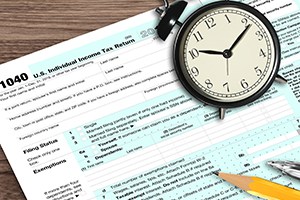By Edward “Ed” V. O’Neal, Vice President and Manager, Retirement Plans
 Print This Post
Print This Post

As the tax deadline approaches, you may be trying to determine the best time to file your taxes. Should I focus my attention on it now or relax and wait until it gets closer to April 15th? It probably comes as no surprise to you that there is no simple answer to this common tax season quandary. It could simply be a matter of personality traits, are you the type of person who likes to get things done ahead of time or are you more comfortable with procrastination? Ultimately, every taxpayer has a unique tax situation, and although personality traits could play a role in the decision to file early or not, there are also some more practical reasons to consider.
For instance, filing early is a great idea for individuals who have all of their tax forms and are anticipating a refund. Taxpayers expecting a refund should keep in mind that the refund is actually an overpayment made to the IRS over the past year, so getting the money back as soon as possible is a sound financial decision. Additionally, filing early typically results in faster processing times for the refund. In fact, electronic filing with direct deposit into a bank account seems to be growing in popularity and is now the fastest way to get your refund.
Filing early could also be advantageous if:
- You owe money to the IRS, as it may give you additional time to fully understand your tax liability and arrange for payment.
- You are anticipating a big life changing event, such as purchasing a home or attending college. Key information required for college financial aid or home purchase approvals are in your hands in a timely manner.
- You are concerned about identity theft. Filing early can lessen the time and opportunity for an identify thief to fraudulently file for you – and steal your refund!
Conversely, you may want to wait to file your tax return if:
- You don’t have all your tax information (i.e. 1099s, schedule K-1s, etc.). An incomplete or inaccurate tax return could require you to file an amended tax return. Amended returns have also been known to invite IRS audits.
- You need additional time to use tax advantaged strategies, such as making tax deductible IRA contributions for the previous calendar year (if you’re eligible).
Lastly, the recently enacted SECURE Act is primarily focused on the 2020 tax year, but a few of the provisions in the Act, such as an expansion of rates for the Kiddie Tax (which will be covered in more detail in an upcoming blog), could impact your 2019 tax filing. Remember to consult with your tax advisor in weighing all the advantages and disadvantages of filing early and how they relate to your filing situation.